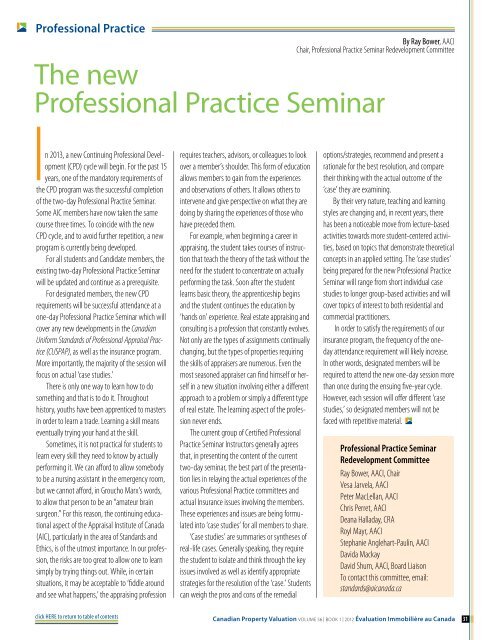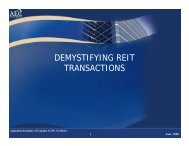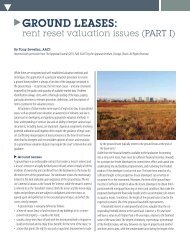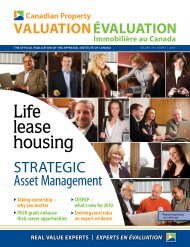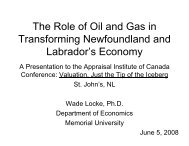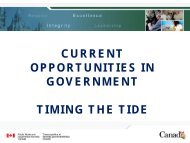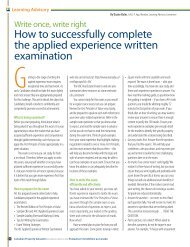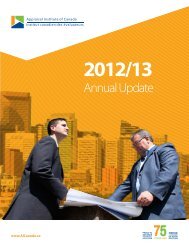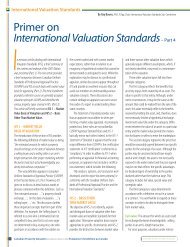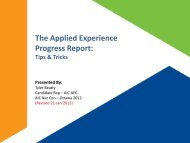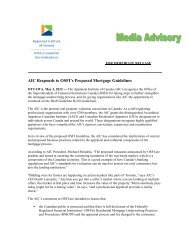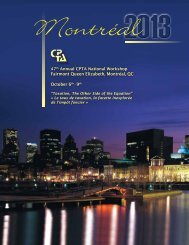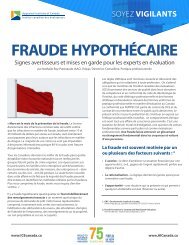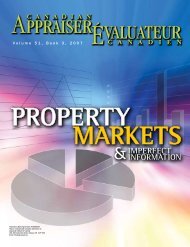Land acquisition Land acquisition Land acquisition - Appraisal ...
Land acquisition Land acquisition Land acquisition - Appraisal ...
Land acquisition Land acquisition Land acquisition - Appraisal ...
- No tags were found...
You also want an ePaper? Increase the reach of your titles
YUMPU automatically turns print PDFs into web optimized ePapers that Google loves.
Professional Practice<br />
By Ray Bower, AACI<br />
Chair, Professional Practice Seminar Redevelopment Committee<br />
The new<br />
Professional Practice Seminar<br />
In 2013, a new Continuing Professional Development<br />
(CPD) cycle will begin. For the past 15<br />
years, one of the mandatory requirements of<br />
the CPD program was the successful completion<br />
of the two-day Professional Practice Seminar.<br />
Some AIC members have now taken the same<br />
course three times. To coincide with the new<br />
CPD cycle, and to avoid further repetition, a new<br />
program is currently being developed.<br />
For all students and Candidate members, the<br />
existing two-day Professional Practice Seminar<br />
will be updated and continue as a prerequisite.<br />
For designated members, the new CPD<br />
requirements will be successful attendance at a<br />
one-day Professional Practice Seminar which will<br />
cover any new developments in the Canadian<br />
Uniform Standards of Professional <strong>Appraisal</strong> Practice<br />
(CUSPAP), as well as the insurance program.<br />
More importantly, the majority of the session will<br />
focus on actual ‘case studies.’<br />
There is only one way to learn how to do<br />
something and that is to do it. Throughout<br />
history, youths have been apprenticed to masters<br />
in order to learn a trade. Learning a skill means<br />
eventually trying your hand at the skill.<br />
Sometimes, it is not practical for students to<br />
learn every skill they need to know by actually<br />
performing it. We can afford to allow somebody<br />
to be a nursing assistant in the emergency room,<br />
but we cannot afford, in Groucho Marx’s words,<br />
to allow that person to be an “amateur brain<br />
surgeon.” For this reason, the continuing educational<br />
aspect of the <strong>Appraisal</strong> Institute of Canada<br />
(AIC), particularly in the area of Standards and<br />
Ethics, is of the utmost importance. In our profession,<br />
the risks are too great to allow one to learn<br />
simply by trying things out. While, in certain<br />
situations, it may be acceptable to ‘fiddle around<br />
and see what happens,’ the appraising profession<br />
requires teachers, advisors, or colleagues to look<br />
over a member’s shoulder. This form of education<br />
allows members to gain from the experiences<br />
and observations of others. It allows others to<br />
intervene and give perspective on what they are<br />
doing by sharing the experiences of those who<br />
have preceded them.<br />
For example, when beginning a career in<br />
appraising, the student takes courses of instruction<br />
that teach the theory of the task without the<br />
need for the student to concentrate on actually<br />
performing the task. Soon after the student<br />
learns basic theory, the apprenticeship begins<br />
and the student continues the education by<br />
‘hands on’ experience. Real estate appraising and<br />
consulting is a profession that constantly evolves.<br />
Not only are the types of assignments continually<br />
changing, but the types of properties requiring<br />
the skills of appraisers are numerous. Even the<br />
most seasoned appraiser can find himself or herself<br />
in a new situation involving either a different<br />
approach to a problem or simply a different type<br />
of real estate. The learning aspect of the profession<br />
never ends.<br />
The current group of Certified Professional<br />
Practice Seminar Instructors generally agrees<br />
that, in presenting the content of the current<br />
two-day seminar, the best part of the presentation<br />
lies in relaying the actual experiences of the<br />
various Professional Practice committees and<br />
actual Insurance issues involving the members.<br />
These experiences and issues are being formulated<br />
into ‘case studies’ for all members to share.<br />
‘Case studies’ are summaries or syntheses of<br />
real-life cases. Generally speaking, they require<br />
the student to isolate and think through the key<br />
issues involved as well as identify appropriate<br />
strategies for the resolution of the ‘case.’ Students<br />
can weigh the pros and cons of the remedial<br />
options/strategies, recommend and present a<br />
rationale for the best resolution, and compare<br />
their thinking with the actual outcome of the<br />
‘case’ they are examining.<br />
By their very nature, teaching and learning<br />
styles are changing and, in recent years, there<br />
has been a noticeable move from lecture-based<br />
activities towards more student-centered activities,<br />
based on topics that demonstrate theoretical<br />
concepts in an applied setting. The ‘case studies’<br />
being prepared for the new Professional Practice<br />
Seminar will range from short individual case<br />
studies to longer group-based activities and will<br />
cover topics of interest to both residential and<br />
commercial practitioners.<br />
In order to satisfy the requirements of our<br />
insurance program, the frequency of the oneday<br />
attendance requirement will likely increase.<br />
In other words, designated members will be<br />
required to attend the new one-day session more<br />
than once during the ensuing five-year cycle.<br />
However, each session will offer different ‘case<br />
studies,’ so designated members will not be<br />
faced with repetitive material.<br />
Professional Practice Seminar<br />
Redevelopment Committee<br />
Ray Bower, AACI, Chair<br />
Vesa Jarvela, AACI<br />
Peter MacLellan, AACI<br />
Chris Perret, AACI<br />
Deana Halladay, CRA<br />
Royl Mayr, AACI<br />
Stephanie Anglehart-Paulin, AACI<br />
Davida Mackay<br />
David Shum, AACI, Board Liaison<br />
To contact this committee, email:<br />
standards@aicanada.ca<br />
click here to return to table of contents Canadian Property Valuation Volume 56 | book 1 | 2012 Évaluation Immobilière au Canada 31


